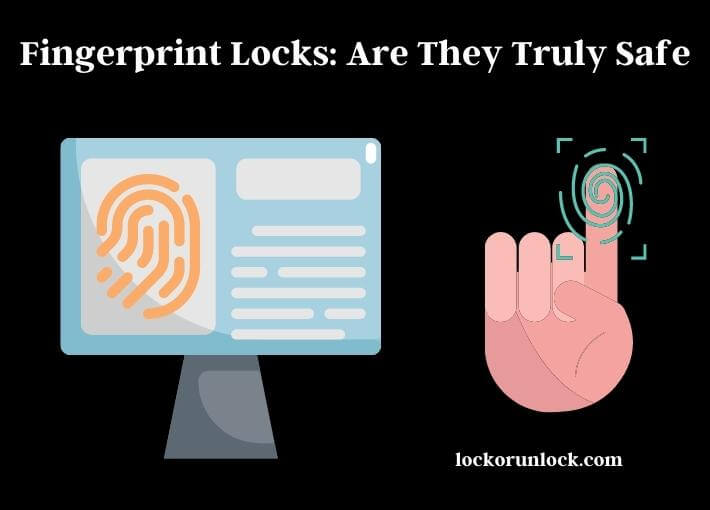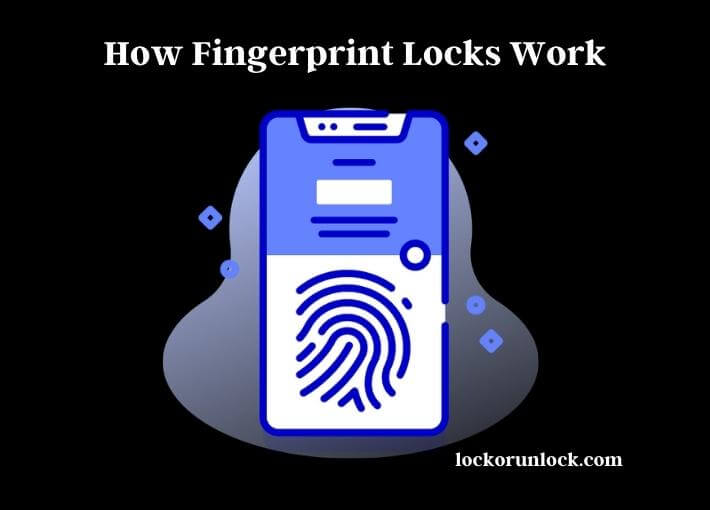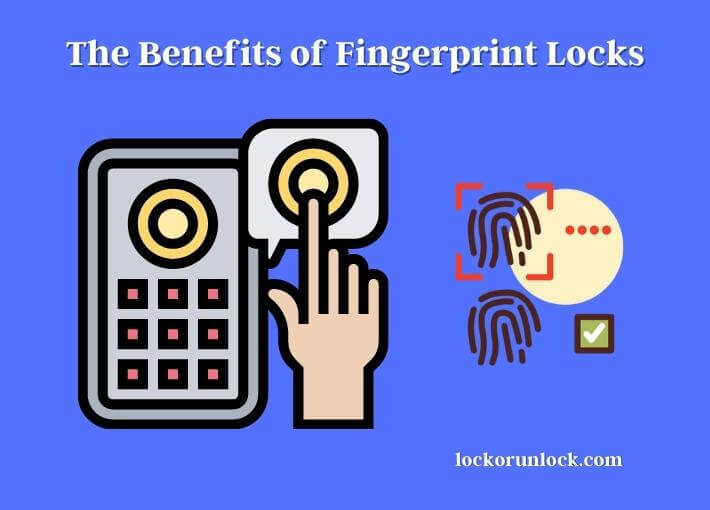Fingerprint locks have become increasingly popular as a convenient and seemingly secure way to protect personal belongings, such as smartphones, laptops, and even homes. They are designed to recognize and verify the unique pattern of ridges and valleys on an individual’s fingertip, granting access only to authorized users. The question remains: are fingerprint locks safe?
Fingerprint locks offer a level of security that traditional locks cannot provide. Unlike a physical key or a combination code, fingerprints are difficult to duplicate or guess, making it much harder for unauthorized individuals to gain access. Many modern fingerprint locks have advanced features like encryption and anti-tampering measures, adding an extra layer of protection.

On the other hand, fingerprint locks are not foolproof. Any security system comes with ways to bypass or hack into them, such as using a high-resolution photograph of a fingerprint or exploiting vulnerabilities in the software. Everyone should know about fingerprint locks’ potential risks and limitations before relying solely on them for security.
History of Fingerprint Locks
Fingerprint locks are a biometric security system that uses a person’s unique fingerprints to control access to a door or other secure area. They have become increasingly popular in recent years due to their convenience and high level of security. Instead of using traditional keys or numerical codes, fingerprint locks rely on biometric data to verify a person’s identity.
This technology offers a range of benefits, including easy and secure access for authorized individuals and enhanced protection against unauthorized entry. Those locks are a reliable and innovative solution for keeping your home or business safe and secure. Brinks locks are one of the most popular and trusted brands regarding home security.
Fingerprint locks have a fascinating history that dates back to the late 19th century when the first fingerprint identification system was invented. The technology behind modern fingerprint locks has come a long way since then, with new biometric technology and security advancements making these systems more convenient and reliable than ever before.
How Do Fingerprint Locks Work?
Fingerprint locks are becoming increasingly popular in homes and businesses as a more secure way to access a building or room. They scan a person’s fingerprint and compare it to a database of previously stored prints to determine if they are authorized to enter.

Here’s a breakdown of how fingerprint locks work:
Enrollment
Users must enroll their fingerprints by placing their fingers on the scanner to start using a fingerprint lock. The scanner then captures an image of the fingerprint, which is converted into a mathematical template that represents the unique features of the print.
Storage
The mathematical template of the fingerprint is then stored in the lock’s memory. Some locks can store multiple fingerprints, allowing several people to have access.
Verification
Users place their fingers on the scanner when they attempt to enter a room or building. The scanner then compares the fingerprint features to the stored templates to determine if there is a match.
Access
The lock grants access if the fingerprint matches one of the stored templates. The safety remains locked if there is no match and the user is denied entry.
Fingerprint locks offer a convenient and secure way to access a building or room, as they rely on a unique physical characteristic of the user rather than a physical key or code that can be stolen or copied.
Different Types of Fingerprint Locks
Several types of fingerprint locks are available on the market, each with unique features and benefits. Here are some of the most common types of fingerprint locks:
Standalone Fingerprint Locks
These locks operate independently and do not require additional hardware or software. They are typically used in residential settings, such as homes or apartments, and can be easily installed on a door without significant modifications.
Networked Fingerprint Locks
These locks are connected to a central system and can be managed remotely. They are often used in commercial settings, such as offices or warehouses, where multiple waves must be addressed and monitored from a central location.
Biometric Access Control Systems
These systems use a combination of fingerprint recognition and other biometric technologies, such as facial recognition or iris scanning, to control access to secure areas. They are often used in high-security environments like government buildings or research facilities.
Smart Locks with Fingerprint Access
These locks are part of a more extensive smart home system and can be controlled through a smartphone app. They offer a range of features, such as remote locking and unlocking, and can be used to monitor access to the home or office.
Padlocks with Fingerprint Access
These locks are designed for smaller items, such as lockers or luggage. They offer a compact and convenient way to secure personal belongings without needing a key or combination.
Fingerprint locks are generally more secure than traditional locks as they rely on a unique biometric identifier, but it needs to note that they are not foolproof. Some models may be vulnerable to hacking or other attacks, so choosing a high-quality lock from a reputable manufacturer is essential, as following best practices for securing your home or business.
Comparison to Traditional Locks
Here is a comparison table between fingerprint locks and traditional locks:
| Aspect | Fingerprint Locks | Traditional Locks |
| Security | They are more secure as they rely on unique biometric identification. | They are more secure as they rely on unique biometric identification. |
| Convenience | Convenient and easy to use, carrying keys or remembering a combination is unnecessary. | Less convenient as keys or combinations may be forgotten or lost. |
| Installation | Easily can install on most doors without significant modifications. | Require professional installation or changes to the door or frame. |
| Maintenance | Need occasional cleaning of the fingerprint scanner. | It needs lubrication or replacement of key components over time. |
| Cost | Generally more expensive than traditional locks. | Less expensive, depending on the type and quality of the lock. |
| Compatibility | It may not be compatible with all types of doors or access control systems. | Can be used with a variety of doors and access control systems. |
| Technology | Relies on advanced biometric technology to scan and store fingerprints. | It depends on simple mechanical or electronic components to lock and unlock. |
Fingerprint locks offer greater security and convenience than traditional locks, but they may be more expensive and require more advanced technology. When choosing a lock for your home or business, you should carefully consider your security needs and budget.
The Benefits of Fingerprint Locks
Fingerprint locks offer several benefits over traditional locks, including:

Enhanced Security
Fingerprint locks use unique biometric identifiers to grant access, which makes them more secure than traditional locks that can be easily picked, bumped, or tampered with. They provide an extra layer of security that prevents unauthorized entry and increases safety for the occupants.
Convenience
Fingerprint locks eliminate the need for keys or combinations, making them a convenient option for homeowners and businesses. There’s no need to carry a key or remember a mix, as you only need your fingerprint to gain entry. This convenience makes them ideal for people who are always on the go or need help finding their keys.
Access Control
Fingerprint locks allow you to control who has access to a building or room. You can store multiple fingerprints in the lock’s memory, making granting access to authorized users easy whilst keeping out unauthorized individuals.
Remote Management
Networked fingerprint locks can be managed remotely, allowing you to monitor who enters and exits a building, even if you’re not on site. This makes them ideal for businesses that need to monitor access to certain areas or for homeowners who want to keep an eye on their property.
Cost-Effective
Fingerprint locks may have a higher initial cost than traditional locks, but they can be more cost-effective in the long run. They require less maintenance and are less prone to breakage, meaning you’ll save money on repairs and replacements.
Fingerprint locks offer a convenient and secure way to control access to a building or room. They eliminate the need for keys or combinations, offer enhanced security, and can be managed remotely, making them an ideal option for homeowners and businesses.
Potential Risks and Vulnerabilities
Fingerprint locks offer many benefits, but they also come with some potential risks and vulnerabilities that you should be aware of:
False Positives and Negatives
Fingerprint scanners can sometimes produce false positives, allowing unauthorized individuals to gain access, or false negatives, denying access to authorized users. This can occur due to changes in the user’s fingerprints, such as cuts, scars, or dry skin, or due to the limitations of the technology.
Hacking and Spoofing
Some fingerprint locks may be vulnerable to hacking or spoofing, where an attacker can replicate or manipulate the fingerprint scanner to gain access. This can occur through various methods, such as using a fake fingerprint, copying the fingerprint data, or exploiting system security weaknesses.
Battery Life
Many fingerprint locks require batteries to function, which can pose a risk if the batteries run out or are removed. The lock may fail to open without power, leaving occupants stranded or locked out of the building.
Compatibility
Not all fingerprint locks are compatible with all types of doors or access control systems. Choose a lock compatible with your door or procedure to ensure proper functioning and security.
Cost
Fingerprint locks can be more expensive than traditional locks, making them cost-prohibitive for some users. Some models may require ongoing maintenance or replacement of parts, which can add to the overall cost over time.
How to Ensure the Safety of Fingerprint Locks?
To ensure the safety and security of fingerprint locks, there are several steps that you can take:

Choose a High-quality Lock From a Reputable Manufacturer
You must select a fingerprint lock from a reputable manufacturer with a record of producing reliable and secure products. Read reviews and check the manufacturer’s website to ensure that the lock meets your security needs.
Regularly Clean the Fingerprint Scanner
To ensure it works properly, you should regularly clean it with a soft, dry cloth. Avoid using any chemicals or liquids that could damage the scanner.
Use Backup Options
In case the fingerprint scanner fails to work, most fingerprint locks come with backup options, such as a key or a keypad. Have a backup option available and keep it in a safe and secure location.
Monitor Access
If you have a networked fingerprint lock, you can remotely monitor who enters and exits a building or room. This can help you detect any unauthorized access and take appropriate action.
Use Additional Security Measures
You can enhance the security of your fingerprint lock by using additional security measures, such as an alarm system or security cameras. This can help deter burglars and prevent break-ins.
Keep Your Lock Up-to-date
It’s necessary to keep your fingerprint lock up-to-date with the latest firmware and security patches. Check the manufacturer’s website periodically to ensure you have installed the latest updates.
Wrapping Up a Conclusion
Fingerprint locks offer several benefits, such as convenience, enhanced security, and improved access control. Like any security technology, fingerprint locks are not foolproof and may be vulnerable to certain risks and vulnerabilities. You must choose a high-quality lock from a reputable manufacturer, regularly maintain and monitor the lock, and use additional security measures to ensure maximum safety and security.
No security system is 100% guaranteed. Taking these steps can help minimize the risks and vulnerabilities associated with fingerprint locks and provide greater peace of mind for home and business owners.
FAQ’s
Are Fingerprint Locks Better Than Traditional Locks?
Fingerprint locks offer enhanced security and convenience compared to traditional locks but also have potential risks and vulnerabilities. The choice depends on individual needs.
How Accurate Are Fingerprint Locks?
Fingerprint locks are generally very accurate, with low false acceptance and rejection rates. They can be affected by certain factors like dirt or damage.
How Do Fingerprint Locks Compare to Amazon Lockers in Terms of Safety?
When it comes to safeguarding your belongings, amazon locker safety and fingerprint locks are both reliable options. While fingerprint locks provide biometric security, Amazon lockers offer a secure location for package delivery and pickup. Ultimately, both options offer advanced safety features for your valuable items.
Can Someone Hack a Fingerprint Lock?
It is possible to hack a fingerprint lock, but it is generally tricky and requires specialized knowledge and equipment. Most fingerprint locks are secure against hacking attempts.
What Happens if My Fingerprint Lock Fails to Recognize My Fingerprint?
If a fingerprint lock fails to recognize your fingerprint, most locks have backup options, such as a key or a keypad, that you can use to gain access.
Can I Use a Backup Key With a Fingerprint Lock?
Yes, most fingerprint locks have a backup key option in case of an emergency or if fingerprint recognition fails. It’s essential to keep the backup key in a safe place.
Do I Need a Professional to Install a Fingerprint Lock?
It is recommended to have a professional install a fingerprint lock to ensure proper installation and avoid any damage to the lock or the door. Some models are designed for easy DIY installation.
Can Multiple People Use the Same Fingerprint Lock?
Yes, multiple people can use the same fingerprint lock by registering their fingerprints in the system. Some models limit the number of fingerprints that can be registered.
How Long Do Fingerprint Locks Last?
The lifespan of a fingerprint lock depends on the quality of the lock and how well it is maintained, but they typically last for several years.
What Should I Do if My Fingerprint Lock is Not Working Properly?
If your fingerprint lock malfunctions, try cleaning the scanner and checking the batteries. If the problem persists, contact the manufacturer or a professional locksmith.
